
สถานีชินจูกุ
Hannah Morseสถานีที่พลุกพล่านที่สุดในโตเกียวคงไม่ต้องอธิบายอะไรมาก แต่ยังไงเราก็จะไปที่สถานีชินจูกุให้ได้

Known as the busiest train station in the world, Shinjuku Station is a massive hub of trains, subways, stores, and passageways in the western part of Shinjuku City. Given Shinjuku’s prime location and popularity as a shopping-and-entertainment ward, it is no surprise that its station matches the lively and chaotic energy. The maze of a facility, which has over 200 exits and platforms and sees over three million people daily, is known to confuse even the most seasoned travelers. Fortunately, the city has initiated a multi billion yen renovation project to redesign and streamline the bustling station. The project began in July 2021 and is scheduled to finish in 2046.
The main station is operated by JR East and has 16 JR platforms. The complex’s other main transportation systems include the:
Odakyu Line (railway)
Keio and Keio New Lines (railways)
Toei Oedo and Toei Shinjuku Lines (subways)
Marunouchi Line / Tokyo Metro (subway)
Both Odakyu and Keio Station are located adjacent to the main JR station on the west side and are situated below the Odakyu Department Store and Keio Department Store, respectively. The Toei Lines along with the Keio New Line are located in the southwestern corner of the complex, while the Marunouchi Lines are situated at the north end. All lines have separate ticket gates.
In addition to train and subway stations, the facility is also connected to bus terminals. Please note that Shinkansen trains do not stop at Shinjuku Station. However, you can easily reach Tokyo Station or Shinagawa Station via the JR Yamanote Line to access the Shinkansen.
The station houses a number of amenities for travelers on the go, including a tourist information center, travel centers, lost & found, currency exchanges, ATMs, police boxes (koban), luggage storage, coin lockers, and more.
Shinjuku Station’s main entrances and exits are the West, East, and South Gates. Read below for more details.
Shinjuku Station is located in the western part of Shinjuku City and is about a 15- to 20-train ride from Tokyo Station.

สถานีที่พลุกพล่านที่สุดในโตเกียวคงไม่ต้องอธิบายอะไรมาก แต่ยังไงเราก็จะไปที่สถานีชินจูกุให้ได้
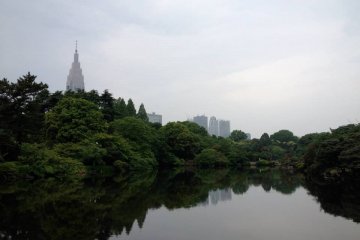
อาคารศาลาว่าการกรุงโตเกียว (Tokyo Metropolitan Government Building), สวนชินจุกุเกียวเอน และ ศาลเจ้าฮะนะโซะโนะ (Hanazono) ในใจกลางชินจุกุ โตเกียวน
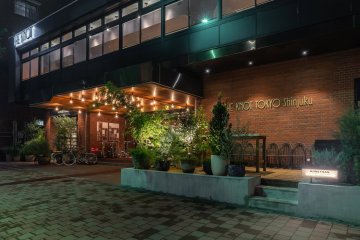
Located right next to Shinjuku Chuo Park, THE KNOT TOKYO Shinjuku is a modern hotel with an exceptional design and easy access to the nearby Shinjuku train station and the Meiji Shrine. The 14-story hotel building was renovated and reopened in August 2018 as THE KNOT TOKYO Shinjuku . The western-style rooms offer a park view on the top floor as well as a newly opened terrace suite. The spacious atrium design offers a relaxed atmosphere and connects the restaurant, bar, lounge and lobby with one another. One of the highlights of THE KNOT is the delicious dishes. There are six areas in which food and drinks are offered. From the grill area to high-quality black tea and fresh bread, everything is on offer.

With Koenji being a "creative town" it's no surprise that the BnA Hotel opened there in 2016 and has had, subsequently, an incredible impact on the local community. BnA (Bed and Art) has other spaces dotted about Tokyo and Kyoto, but the Koenji edition is possibly more immersive as the concept is "stay in an artwork." In collaboration with local artists, the BnA has created an impressive multi-storey art experiment for art lovers and creatives with a desire to inhabit art. The first floor acts as a front desk and bar which comes alive at night with events and selected DJs. It also hosts Masu Masu onigiri cafe with artists being asked to come and exchange artwork with each other in a gesture which reflects the true spirit of Koenji. With two "living art" twin rooms taking up the second and third floors designed by a seasonal rotation of local artists, guests can engage with and inhabit their art rooms. BnA Koenji also plays host to a rooftop lounge and a basement space which is used for artists residencies where their work is shown to the public and a DJ booth and streaming equipment for live performances. With live painting events and an eclectic variety of regular events, the BnA Hotel becomes, itself, a living canvas. The BnA believes that it's a machigata hotel, meaning that guests should (and are encouraged) to interact with Koenji. Use the public sentos, eat in the local restaurants that surround the hotel and buy locally from the multitude of shops, market stalls, bars and cafes which make-up the fabric of Koenji. Feted by international press such as The Guardian, BnA acts as a creative network with the concept of serendipity being discussed as the bar becomes an ad hoc meeting place where collaborations and friendships between artists and locals are born. The BnA was also instrumental in a street art festival named MCP (Mural City Project) which was supported by Suginami Ward. MCP was incredibly ambitious and truly communal with the desire to transform and coalesce the community through the creation of public murals. The BnA, Koenji and Suginami spearheaded a public art movement which should be commended and replicated throughout Tokyo.
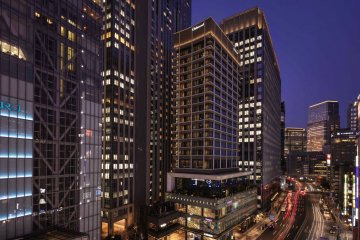
Oakwood Premier Tokyo comes from a brand of standout luxury hotel & service apartments right at the heart of the Tokyo metropolis. It is located in the business hub of Marunouchi with JR Tokyo Station in close proximity. This will allow guests and travelers to easily access the city's extensive transport network and visit various landmarks such as Imperial Palace, Tsukiji Fish Market, Ginza and Shopping District. Boasting 123 luxurious apartments on the upper floors of a multi-serviced complex, each room offers a magnificent view of the city, not to mention all furnished and a fully-equipped kitchen set which is rarely seen in your everyday service apartment. Without doubt, these spacious tranquil retreats are curated to give you the amenities and services of a luxury hotel and a feeling of home. They are good options for both business executives and leisure travelers from one night of a short-stay to a few weeks/months of mid-to-long-term stay.
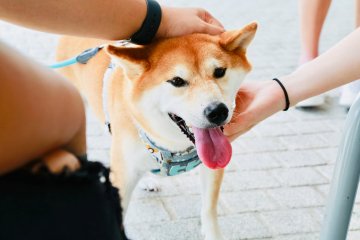
Mame Shiba Cafe offers a unique experience where you can interact with Shiba dogs while enjoying your favorite drinks. You cannot make reservations in advance through phone or online, so it is best to book early in the morning at a store. The cafe requires customers to make a reservation in-store, present their receipt at the reserved time, and then enter the cafe.

B-Flat Commune is an open-air hangout in Omotesandō featuring a variety of stalls and food trucks offering unique drinks, clothing, and bites to eat. Its relaxed vibe and plenty of seating make it an ideal spot for casual meetups and spending time with friends. It's a creative place where people can gather to eat a the open-air dining space or purchase fashion, antiques, product goods and other lifestyle items. Events are sometimes hosted at this community space, and operating stores may change from month to month.

If you're a fan of Quentin Tarantino’s Kill Bill, there's one Tokyo restaurant that absolutely deserves a spot on your bucket list. While you may not know it by its real name, chances are you've seen it on screen—it’s the unforgettable setting for the iconic, over-the-top showdown between The Bride and the Crazy 88. Known affectionately by fans as “The Kill Bill Restaurant,” this venue offers more than just cinematic nostalgia—it's a vibrant and unique dining experience in its own right. Located in Tokyo’s upscale Nishi-Azabu district, this classic-style izakaya bar is where fiction meets flavor. Though the fake blood and samurai swords have long been cleaned away, the spirit of the film lives on in the architecture and atmosphere. Stepping inside feels like walking onto the set: a grand, high-ceilinged hall with a central open-plan dining space, surrounded by a mezzanine-level balcony—instantly recognizable to anyone who’s watched the movie. But don’t mistake it for just a movie-themed attraction. The Kill Bill restaurant is a serious culinary destination. It offers a wide variety of traditional Japanese dishes, from sashimi and grilled skewers to noodle dishes and seasonal specialties. The menu also boasts creative fusion items like avocado and camembert tempura, which nods to the restaurant’s global popularity and mindset. And for international travelers with specific dietary needs, the restaurant provides vegan and halal-friendly menus (with at least three days’ notice). What makes this spot truly special is its ability to deliver a top-tier gourmet experience while doubling as a pop culture pilgrimage. You can sip sake where Uma Thurman once sliced through waves of enemies—minus the chaos, of course. Whether you’re a die-hard Tarantino fan, a foodie on the hunt for authentic Japanese flavors, or simply someone looking for a unique night out in Tokyo, this restaurant checks every box. Just one tip: Enjoy the drinks and dishes, but leave the swordplay to the professionals. Note: As you’d expect, Gonpachi is a popular restaurant. Same-day reservations are possible, but ideally you’ll want to reserve your table at least two days ahead of your visit, and even earlier if you’re planning to visit at the weekend.
![Robot Restaurant [Closed] Robot Restaurant [Closed]](https://a2.cdn.japantravel.com/photo/poi-163-208353/360x240!/tokyo-robot-restaurant-208353.jpg)
The robot restaurant in the Kabukicho Shinjuku entertainment district offers an extraordinary experience for those looking for something really flashy. Not only is there a place to eat and drink, but guests are also entertained with a show of a different kind. Huge remote-controlled robots, rhythmic drums, wild lasers and energetic dancers tell small stories strongly inspired by Japanese pop culture and tradition in a kind of theater show made up of several acts. In order to become a certain part yourself, you can cheer on the performers with the glow sticks known from Japanese concerts. These can be borrowed free of charge or you can also bring your own.
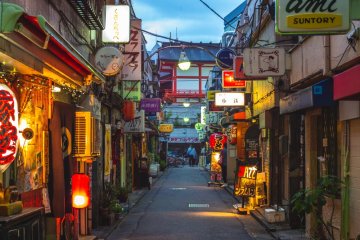
Shinjuku Golden Gai is a small area in Kabukicho, Shinjuku, that is famous for both an area of architectural interest and nightlife. It consists of a network of six narrow streets connected by even narrower passageways that are just wide enough to be traversed by a single person. Over 200 tiny bars, clubs, and restaurants are here. Each tiny entrance is individually covered with stickers, sometimes spotless and painted, sometimes aged and battered. However, if you visit Shinjuku Golden Gai you should bring enough cash with you as the area is not cheap. As many of the buildings host more than one bar, the steep stairs can make for a completely different experience. Shinjuku Golden Gai is known as a meeting place for musicians, artists, directors, writers, academics and actors, including many celebrities. Many of the bars only receive regulars, so you might have to look around here to find the best spot for the night.
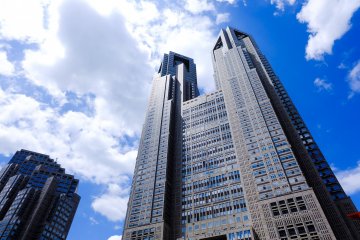
The Tokyo Metropolitan Government Buildings (東京都庁舎, Tōkyō Tochō) are comprised of the North and South and house many offices relating to the local city government. The building is best known for its free observatories, one in each tower, which offer stunning panoramas of the city and the surrounding prefectures. The observation decks sit at 202 meters above the ground, giving visitors a true birds’ eye view of the Tokyo skyline. Iconic structures – such as Odaiba’s Rainbow Bridge, the Tokyo Dome, the Tokyo Skytree and Tokyo Tower – can usually be seen. On clear days, Mt Fuji is often visible on the horizon. Panels along the walls of both observatories detail the buildings that can be seen from each direction. The North Observatory usually remains open until 11pm at night. It’s a great opportunity to see the sunset or catch the evening glow of the metropolis. On days when the North Observatory closes early, the South Observatory compensates by staying open late. The building is designed by Kenzo Tange. Each observatory boasts a café as well as a small souvenir outlet. On the 2nd floor of the building, there is also a large tourist information center that dispenses brochures and knowledge on all parts of Tokyo, as well as some of the surrounding cities and prefectures. The government buildings often host local product fairs on the observation decks to highlight regional delicacies and goods. Past fairs have featured such items as Shizuoka’s tea and seafood products, apple-themed goods from Tohoku and soba noodles from the Nagano region.